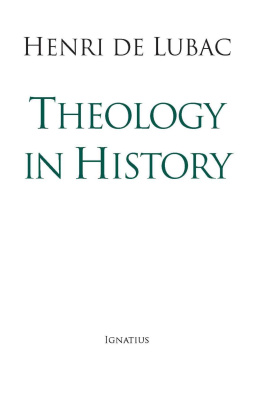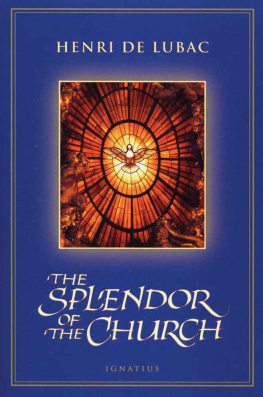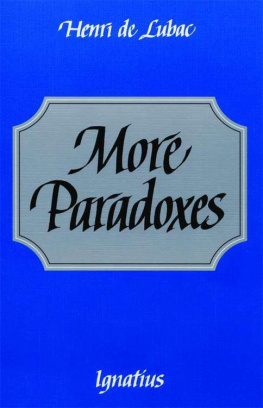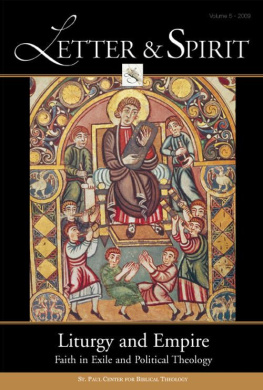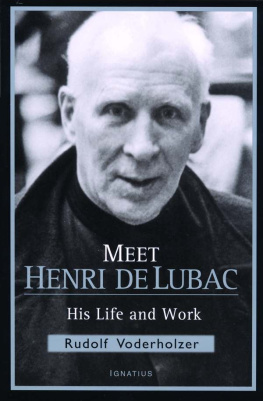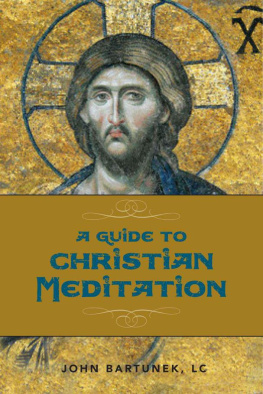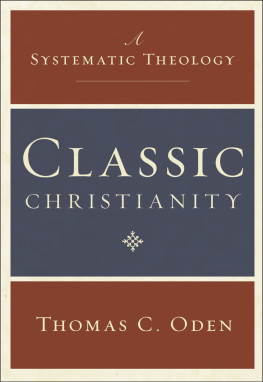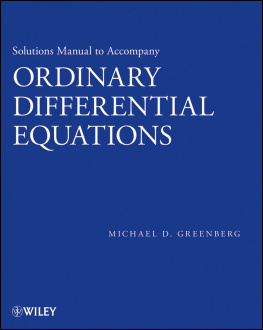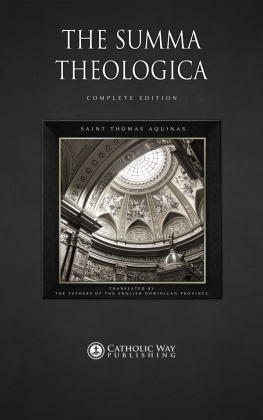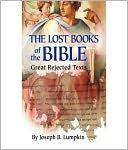THEOLOGY IN HISTORY
HENRI DE LUBAC
THEOLOGY IN HISTORY
PART ONE
The Light of Christ
PART TWO
Disputed Questions and
Resistance to Nazism
With a Foreword by Michel Sales, S.J.
Translated by Anne Englund Nash
IGNATIUS PRESS SAN FRANCISCO
Title of the French Original:
Thologie dans lHistoire:
I. La Lumire du Christ
II. Questiones disputes
et rsistance au nazisme
Descle de Brouwer, Paris
Cover by Roxanne Mei Lum
1996 Ignatius Press, San Francisco
All rights reserved
ISBN 978-0-89870-472-3
Library of Congress catalogue number 93-78537
Printed in the United States of America
Contents
THE LIGHT OF CHRIST
The Light of Christ
DISPUTED QUESTIONS AND
RESISTANCE TO NAZISM
The Texture of a Work and Its Unity
Omnem novitatem attulit semetipsum afferens, qui fuerat annuntiatus .
He has brought total newness by bringing himself.
Saint Irenaeus. Adversus Haereses , IV, 34, 1.
Foreword
This collection of articles and texts by Father de Lubac, some of which have not been published before, are being published here as a continuation of the volume entitled Theologies doccasion (1984) [English translation: Theological Fragments (San Francisco: Ignatius Press, 1989)]. It has been compiled in the same spirit and with the same intention. If, overriding the excessive modesty of its author, we have given this collection another title and put the fine word Theologie in the singular, it is because, in our eyes, the fact that many of the texts it contains were written in order to respond to situations that were at times singularly serious for the Christian conscience, far from diminishing the greatness and the unity of true theological work, in fact manifests its true nature. It is true that many of these texts were occasional, either in the commonplace sense of acceding to a request for the purpose of some congress or some collection or some preface or, too, because a given situation whose stakes could be serious, as much for the Church as for the life of the world (as was the case with the Nazi peril), seemed to invite Father de Lubac to intervene in some debate. But other texts, such as the long article on The Mystery of the Supernatural, without failing to have caused and still today to cause a great stir, go well beyond the occasion that gave rise to them to touch the substance of Christian revelation.
When useful, we have placed in an unnumbered note a few historical or bibliographical pieces of information capable of clarifying what was at stake in the published text. In addition, we offer here a few preliminary remarks on the rubrics by which we have regrouped the texts assembled into this collection. We hope the reader will find here both a guide and an invitation to enter into a better understanding of the selection that governed its composition.
Under the title The Fathers and Christian Humanism, the reader will find, in addition to an article of great timeliness on the priesthood according to Saint John Chrysostom, an important study on the salvation of Origen. This text serves as a complement to the four volumes of LExgse mdivale [Medieval exegesis], as do the prefaces that we have brought together on similar subjects. This section also contains an unpublished text on the famous thought of Pascal: The eternal silence of these infinite spaces frightens me.
Under the title Tripartite Anthropology will be found the draft, entirely unpublished in French, of a work to which Father de Lubac attributed great importance, even if he was unable to bring it to conclusion. These pages complete the text on Mysticism and Mystery published in Theological Fragments (3 5-69). Even unfinished, we believe it to be sufficiently perfected in its governing principles and especially capable of opening for future workers a sure and fruitful path of historical investigations as well as of systematic reflection.
At the end of the last work he published, Father de Lubac confided an invaluable secret.
I cannot help thinking that it is a certain spiritual superficiality rather than the feeling of my intellectual deficiencies or even than the conviction that I am far too unequal to such a subject to dare ever to approach it head-on, that has always made me postpone undertaking that work on Jesus Christ that would have been dearer to me than all the others, and in view of which I did much reading and recorded many reflections but which I never really attacked.... Without claiming to refer to anything other than the Gospel such as the Church transmits it to me, I can nevertheless make my own the words of Moehler on Jesus, with little concern for the whiff of pietism that some of our adult minds would criticize in them: I think I would no longer want to live if I were no longer to hear Him speak.
We believed we could not satisfy the demands of such a confidence better than by concluding the first part of this collection with the beautiful study on The Light of Christ, published during the darkest hours of the twentieth century, when the Nazi barbarity seemed to be sweeping it away.
The contents of this first part justify its subtitle: The Light of Christ, without any need for further explanation.
All that remains to be said is why and how we distributed the texts of the second part of Theology in History : Disputed Questions and Resistance to Nazism.
The long section entitled, Disputed Theological Questions and Anticipations of Vatican II is comprised of a series of texts written between the beginning of the forties and the beginning of the seventies. Opening with a twofold diagnosis of the religious and theological situation in 1942 and 1946, it contains several texts whose historical resonance and importance were considerable, given the circumstances. There is no need to dwell on the articles concerning The Development of Dogma and The Mystery of the Supernatural. It would be worthwhile, on the other hand, to say a word about a text destined to find, paradoxically, an unexpected echo. Having remained unpublished because of unrelated reasons of the author, The Doctrine of Father Lebreton on Revelation and Dogma according to His Anti-Modernist Writings was written by Father de Lubac over the course of fifty years and several times proposed to the review of the theologians of the Society of Jesus consulted by the Superior General of the Order, who always refused to authorize its publication. Father de Lubac had to give up the idea of publishing these pages, whose principal ideas were to be found not only authorized but confirmed by the constitution Dei Verbum on Divine Revelation of the Second Vatican Council.
It will be noted that we have not included in this collection texts and articles written by Father de Lubac about the Second Vatican Council. The reason for this is that the major portion of the latter have already been published in other collections or in separate works that are still easily available today. and to the volume entitled Entretiens autour de Vatican II [Conversations about Vatican II] (Paris: Cerf, 1985), which contains an invaluable diagnosis on the twenty years that followed the Council.
In a recent work, Rsistance chrtienne lantismitisme: Souvenirs 1940-1944 (Paris: Fayard, 1988 [English translation: Christian Resistance to Anti-Semitism: Memories from 1940-1944 (San Francisco: Ignatius Press, 1990)]), Father de Lubac tried to strike an impartial balance in testifying, in a manner that is at once precise, nuanced and discreet, about events in which he participated in the front ranks. We have regrouped under the heading entitled Resistance to Nazism and to Anti-Semitism several of the principal texts published during the Occupation, except for the recently reprinted Cahiers clandestins du Tmoignage chrtien (which is a collective work).

